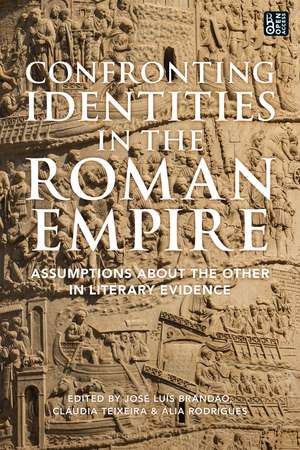Confronting Identities in the Roman Empire: Assumptions about the Other in Literary Evidence
Editat de José Luís Brandão, Cláudia Teixeira, Ália Rodriguesen Limba Engleză Hardback – 13 dec 2023
Preț: 514.10 lei
Preț vechi: 733.35 lei
-30% Nou
Puncte Express: 771
Preț estimativ în valută:
98.38€ • 102.13$ • 82.04£
98.38€ • 102.13$ • 82.04£
Carte tipărită la comandă
Livrare economică 25 martie-08 aprilie
Preluare comenzi: 021 569.72.76
Specificații
ISBN-13: 9781350353985
ISBN-10: 1350353981
Pagini: 384
Dimensiuni: 156 x 234 x 25 mm
Greutate: 0.71 kg
Editura: Bloomsbury Publishing
Colecția Bloomsbury Academic
Locul publicării:London, United Kingdom
ISBN-10: 1350353981
Pagini: 384
Dimensiuni: 156 x 234 x 25 mm
Greutate: 0.71 kg
Editura: Bloomsbury Publishing
Colecția Bloomsbury Academic
Locul publicării:London, United Kingdom
Caracteristici
Brings together the perspectives of ancient and modern authors on the topic of Roman identity
Notă biografică
José Luís Brandão is Associate Professor in Classic Studies at the University of Coimbra, Portugal, and Researcher at the Centre for Classic and Humanistic Studies (CECH) and PI of the BioRom Project (2018-22). Cláudia Teixeira is Associate Professor of Literature at the University of Évora, Portugal, and Researcher at the Centre for Classic and Humanistic Studies (CECH), University of Coimbra and co-PI of the BioRom Project (2018-22). Ália Rodrigues is Researcher at the Centre for Classic and Humanistic Studies (CECH), University of Coimbra, Portugal and Postdoctoral Fellow of the BioRom Project (2018-21).
Cuprins
Introduction: José Luís Lopes Brandão (University of Coimbra, Portugal), Cláudia Teixeira (University of Évora, Portugal) and Ália Rodrigues (University of Coimbra, Portugal) Part I: Confronting Identities: Othering Communities and Groups1. Performing Identities in Rome's Western Provinces Louise Revell (University of Southampton, UK)2. Decolor Heres: Dark Skin in the Roman Cultural Imagination Mario Lentano (University of Siena, Italy)3. Cicero on Foreign Religious Images and Practices Claudia Beltrão (Federal University of Rio de Janeiro, Brazil)4. Where Reason Could Not Prevail: Barbarian Othering and Diplomatic Double-Standards Caesar's Commentarii De Bello Gallico Ralph Moore (Trinity College Dublin, Ireland)5. Non Idem Esse Romani et Graeci: Varro's De Re Rustica and the Integration of the Roman World Selena Ross (Rutgers University, USA)6. Pirate Alterity in Plutarch. The Roman Influence on the Construction of the Autre Pirate in the Moralia Francisco Martínez (University of Sevilla, Spain)7. Contra mores maiorum: Barbarian Women Prisoners During the Principate and the High Empire Denis Álvarez Pérez-Sostoa (University of The Basque Country, Spain)8. Dio of Prusa's Get? In the Context of the Ethnographic Production of his Age Paolo Desideri (University of Florence, Italy)9. News from a Mundus Senescens: Romans, Visigoths and Saxons in a Letter by Sidonius Apollinaris (viii 6) Filomena Giannotti (University of Siena, Italy)10. The Geography of Otherness in the Roman Empire: Exile and Belonging Eleni Bozia (University of Florida, USA) Part II: Confronting Identities: Othering Individuals11. The Use of Wet-Nurses in Ancient Rome as a Way of Rupturing the Mores Pedro D. Conesa Navarro (University of Murcia - University of Oviedo, Spain) and Sara Casamayor Mancisidor (University of La Rioja, Spain)12. Greek Lawgiver in the Epitome of Pompeius Trogus: Justin's Account of Lycurgus Martina Gatto (University of Rome, Italy)13. Sophonisba or the Construction of Other Women Nuno Simões Rodrigues (University of Lisbon, Portugal)14. Self-Perception in the Construction of the Other: Case-Study of Roman Portrayal of Viriatus, Arminius and Boudica Ruben Henrique de Castro (NOVA University Lisbon, Portugal)15. Novel Gifts: Imperial Self-Fashioning from Non-Normative Bodies Serena Connolly (Rutgers University, USA)16. Othering the Emperor in Suetonius José Luís Brandão (University of Coimbra, Portugal)17. Gallienus in the HA: Othering in Biography Cláudia Teixeira (University of Évora, Portugal) Notes Bibliography Index
